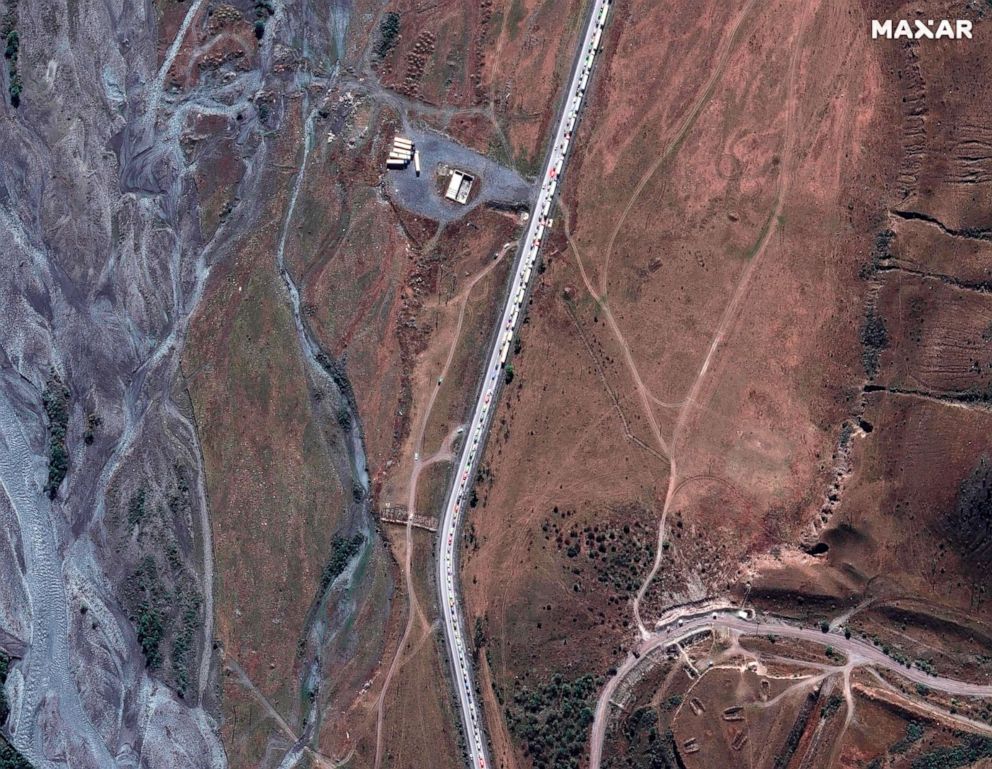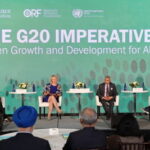Tens of thousands of Russians continue to try to flee the country, fearful of being caught up in the military mobilization ordered by president Vladimir Putin last week to replenish his forces in Ukraine.
Miles-long lines of traffic have formed at border crossings with some neighboring countries amid the exodus, as Russians pack exit routes, worried the government might soon impose further restrictions on military age men leaving.
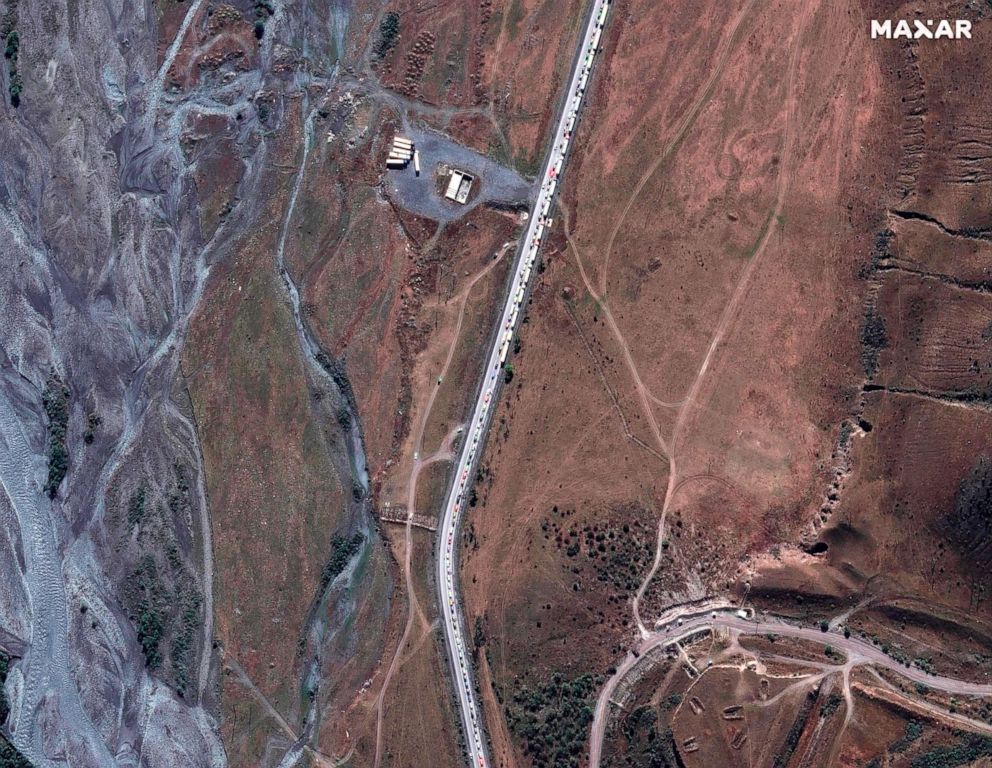
This satellite image provided by Maxar Technologies on Sept. 26, 2022, shows an overview of the traffic jam near the Russia border with Georgia on Sept. 25, 2022, after Russian President Vladamir Putin announced a partial mobilization in Russia.
Maxar Technologies via AP
Officials in Kazakhstan, which borders Russia to the south, said 98,000 Russians have crossed into their country since Putin announced the mobilization last Wednesday. Georgia’s interior ministry told ABC News Tuesday that 100,000 had entered its territory in the past few days. Tens of thousands more have left via other countries, including Finland and Mongolia. The European Union’s border service said 66,000 Russians had entered the bloc over the past week, 30% more than the week before.
Russians began fleeing the country within hours of Putin’s ordering what he called a “partial” mobilization to call-up 300,000 men in an effort to reverse the course of his faltering war in Ukraine. In reality, experts say there are little restrictions on who can be drafted and there are widespread reports of men being mobilized regardless of their eligibility.
Although the mobilization for now is officially meant to apply only to those with some military experience, many fear the criteria could be expanded and that the government could block military age men from leaving the country. Men subject to the draft are barred from leaving the country and widespread reports are emerging of men with military experience being turned back from borders.
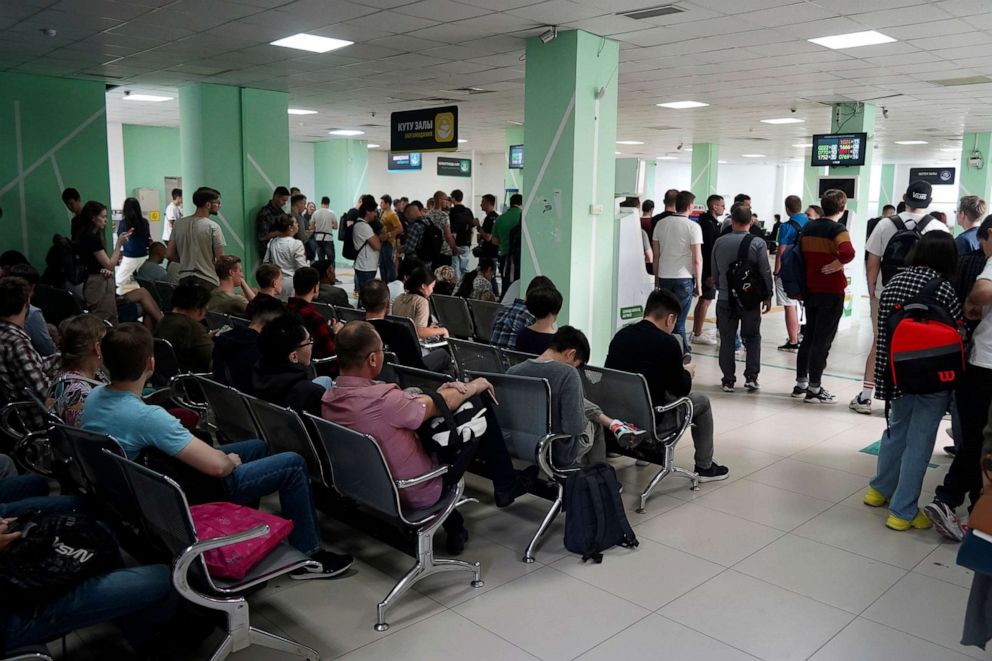
Russians wait and lineup to get Kazakhstan’s INN in a public service center in Almaty, Kazakhstan, on Sept. 27, 2022.
Vladimir Tretyakov/NUR.KZ via AP
At the Verkhny Lars crossing where Russia borders Georgia, a line of hundreds of cars has formed, stretching back around 12 miles, according to journalists there, with thousands of people waiting, some sleeping in their cars. The BBC reported 2,500 cars were currently in the line, citing Russia’s customs service.
Russian authorities on Tuesday confirmed that Russian troops with armored vehicles had set up a checkpoint at the crossing to turn back those subject to the call-up and were handing out draft papers there. Officials said a mobile enlistment office had also been set up at the border crossing.
Kazakhstan, which has a nearly 5,000 mile-long border with Russia and a relaxed entry regime, has become a magnet for those leaving, with border crossings swamped. A 37-year-old man who entered Kazakhstan Monday near the Oral-Uralsk crossing said the line of traffic waiting at one checkpoint point now stretched nearly 20 miles.
“There’s simply a hellish line — it’s endless. And moreover at all checkpoints,” the man, a manager from Tver, a city just outside Moscow, said by phone. He asked to remain anonymous for fear of punishment by the Russian authorities.
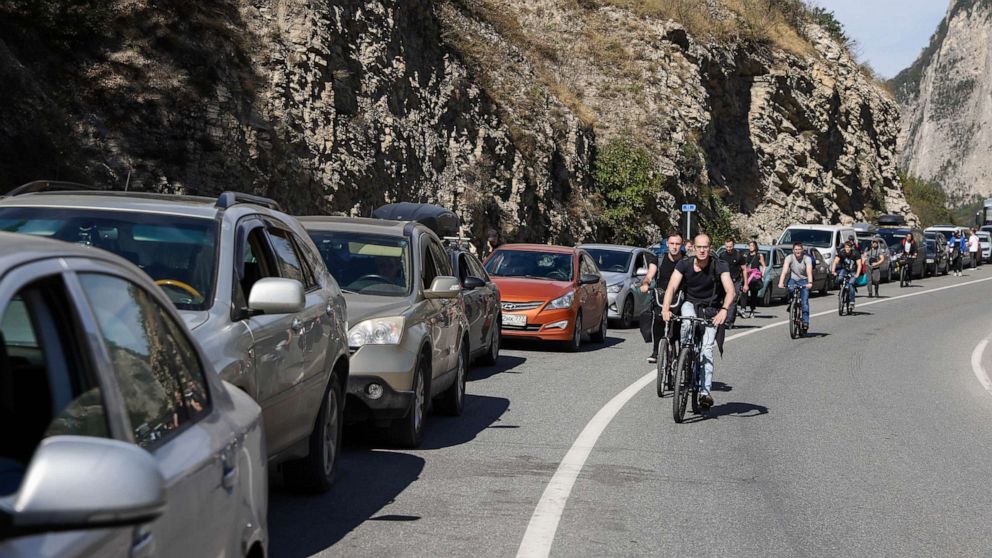
People ride bicycles along a queue of vehicles at the Verkhny Lars checkpoint in North Ossetia, Russia on the border to Georgia, on Sept. 27, 2022. Around 3.5 thousand cars are queueing at the checkpoint to cross the border from Russia to Georgia.
Yelena Afonina/TASS via ZUMA Press
The man said he had spent 20 hours by road to reach the border from Moscow and was now in the border city of Uralsk, on the Kazakhstan side. Although he is currently not subject to the draft because he has no military experience, he said he had still decided to flee because he feared the borders being closed soon and did not believe in fighting against Ukraine.
“There is a risk that later you will simply find yourself in a cage,” he said.
He said he had chosen to leave despite having only $250 in his pocket and planned to stay with relatives initially, before finding work in Kazakhstan.
“I’m preparing myself for a hard time. I’m preparing myself that I won’t know where to sleep, what I’m going to eat,” he said.
A local journalist writing for the Russian outlet Novaya Gazeta.eu wrote, that hundreds of Russian men with luggage could be seen on the streets in Uralsk. Local authorities have reportedly commandeered a cinema to house some of the influx.
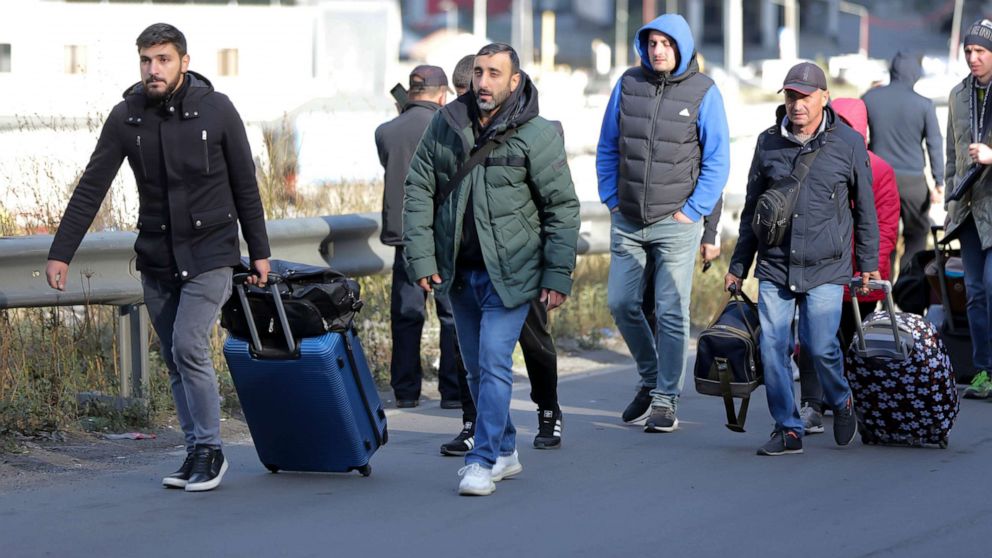
A group of Russians walk after crossing the border at Verkhny Lars between Georgia and Russia in Georgia, on Sept. 27, 2022.
Zurab Tsertsvadze/AP
The sudden mobilization has abruptly brought home the war for millions of Russians, after months during which the Kremlin has sought to present it as a distant conflict with little effect on people’s daily lives. Group chats have sprung up on the Telegram social media platform, where Russians anxiously trade information about potential crossing points and look for spots on transport headed over the borders. One chat called Guide to the Free World, has over 100,000 members.
The Kremlin has said for now it has made no decision on whether to close Russia’s borders in response to the mobilization.
Asked by journalists on Monday about reports in independent Russian media that the Kremlin was considering closures in the coming days, Putin’s spokesman Dmitry Peskov said he was “not aware of anything about that.”
“At the present moment, no decisions have been taken on that account,” he said.
The branches of the Federal Security Service in the southern Kurgan and Tyumen regions told the TASS state news agency, that border guards were stopping those subject to mobilization, informing them they must appear at their enlistment offices.

